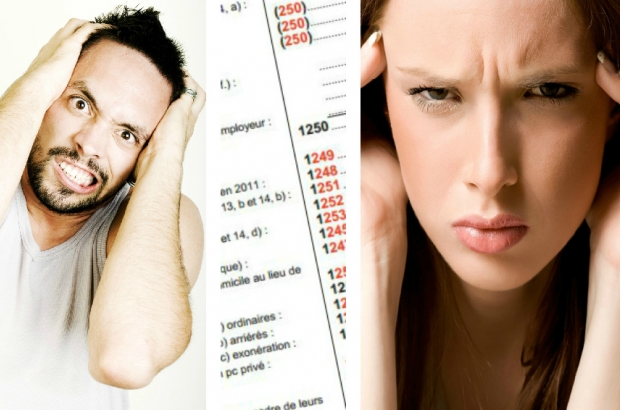- Daily & Weekly newsletters
- Buy & download The Bulletin
- Comment on our articles
Happy returns? Filling out your tax form – Part 2
You have finally made your choice between paper and online but still, not everything makes sense. Far from it. In the second of our two-part guide, we look at ways to avoid unnecessary complications, examine how married couples have to fill out their tax return(s) and discover that help, and free help at that, is at hand.
Simplified tax return
Some taxpayers whose situation does not change from one year to another do not have to file a tax return. That is the case for, among others, retirees who only have a state pension, the unemployed or people who live on an invalidity or illness allowance. The tax authorities send them a letter with the information that they have on file and calculate the tax to be paid or reimbursed. If you receive a proposal of a simplified tax return, you do not need to complete a tax return unless you have other income not mentioned in the letter, such as rental income, income as a self-employed person, company director, etc.
If you agree with the information in the letter, you do not need to do anything. You will receive the tax assessment in the coming months. If the letter shows a reimbursement in your favour, you will receive the amount mentioned in the coming months.
If the information in the letter is not correct, you can adapt the information online via Tax-on-web, or you can complete the answer form and return it by 26 June. You will then receive a tax assessment.
Help
If you need help, you can ask the tax authorities to help you fill out your tax return. They organise information sessions to help you in shopping precincts and town halls. You can also go and see them in their own offices (from 9.00 until 12.00), or call them on 0257/257.57 or email them at info.tax@minfin.fed.be. If you take your annual statements summarising your income(s) and tax withholding, any certificates for tax deductions, last year’s tax assessment and the bill for the annual real estate tax, they can help you fill out your return.
Filing jointly or separately
In Belgium, spouses and legal cohabitants don’t get to choose whether they file jointly or separately. If you ‘only’ live together, you file separate returns. It is only if you register your partnership at the commune, or if you marry, that you file your tax return together, but only for the income of the following year.
The income of your year in which you married or registered your partnership must still be filed on a separate tax return. If you married on 14 February 2013, the tax return you receive in April 2013 will be for your 2012 income and that must be filed separately. The tax return for your 2013 income must also be declared separately. It is only in 2015 that you will file jointly.
Conversely, when you separate and take up separate residences, you will file separate tax returns again, but only for the income of the year following your separation. If you separated last year, your 2012 income still has to be declared on a joint tax return. Yes, that means that you should meet with your ex to complete the tax return together. The tax authorities understand that this may get awkward, and they will not object if you file a separate tax return. It is only for the year after your separation, for your 2013 income, that you file separate tax returns.
When you file separately, you get separate tax assessments and/or separate tax bills. When you file jointly, you receive one joint assessment.
Filing jointly should not make much of a change, the tax is calculated for each spouse separately on their earnings and on their investment income (rent, interest, dividend etc.). That is the tax return has a column for each spouse. Income from investment income that is owned by both spouses must be split in two, that is the case for the cadastral revenue of property that is let out, for interest on joint bank accounts, etc.
The tax assessment also has two columns, one for each spouse; the income is added up for each spouse, and each spouse has his own personal allowance of €6,800 (for 2012), which results in a tax reduction of €1,700.
Marriage or a registered partnership does not make the tax go up. However, where getting married or registering your partnership can be interesting is where one spouse or partner is not working or has an annual income of less than €2,990. In that case 30% (with a maximum of €9,810) of the other’s income is deducted and taxed with the stay-at-home partner/spouse. That part is then taxed at a lower tax rate.
Taxpayers who are married to an official of one of the European Institutions or an international organisation file separate tax returns. However, they must mention that their spouse or partner is an international official (the taxman does not want them to get this marital deduction).
The assessment (that is, the demand to pay the tax), shows one figure as the tax due or the tax to be reimbursed. The reimbursement will go on the bank account mentioned in the tax return, and usually that is a joint account. However, if tax is due, who has to pay that tax? You should be able to work out who has to pay how much tax. In case of doubt, you can ask the taxman to tell you exactly how much tax each of you owe him. That makes it easier to settle accounts later with your ex.
Marc Quaghebeur is a lawyer and partner at De Broeck, Van Laere & Partners
More information at www.taxation.be




















Comments
If you don't have income should you fill it in with 0 for value? Thanks.